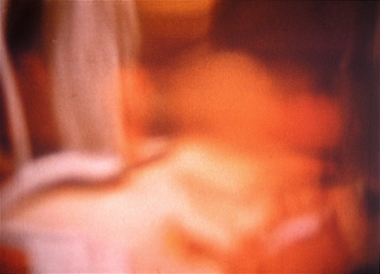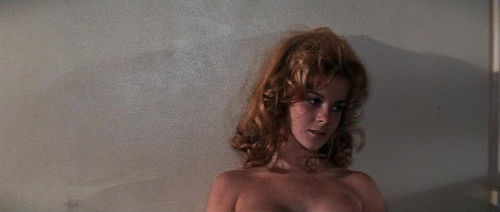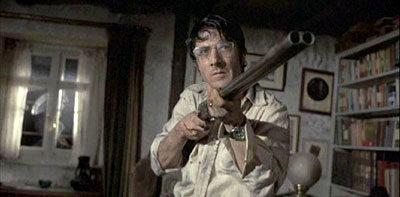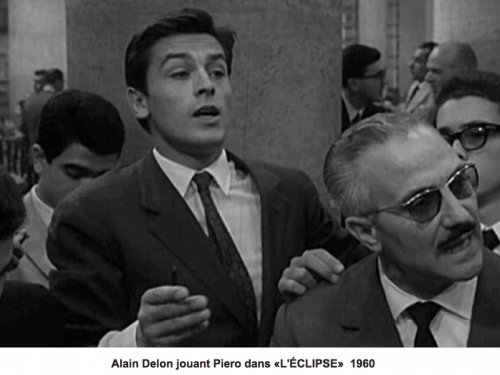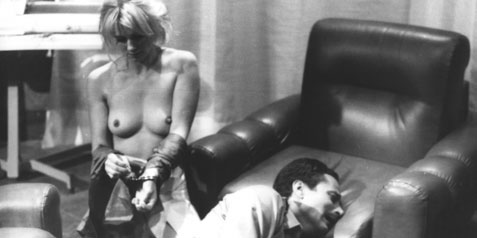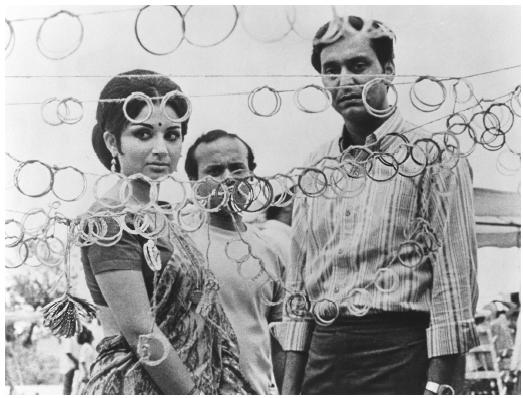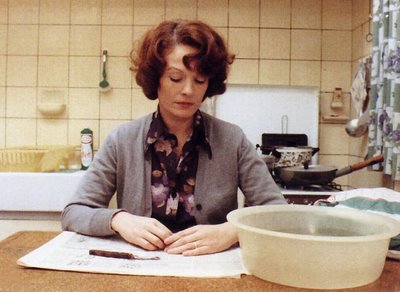From Film Comment, July-August 1982. — J.R.
Movies Plus One by William S. Pechter, 246 pp., index, Horizon Press, $14.95.
Ever since certain American film critics have taken to collecting their own reviews and/or commanding their own screenings, the solipsistic nature of their profession has tended to grow. It is a tendency that crosses cult boundaries, characterizing the Neros of the profession as well as the Babbitts, the scarlet empresses as well as the Sylvia Scarletts. In her celebrated and lengthy attack on Pauline Kael in the New York Review of Books two summers ago, Renata Adler indirectly broached this problem by singling out the distressing evidence of one very gifted intelligence having run amok — a charge largely made on stylistic and rhetorical grounds, and persuasively shaped around the assumption that what was really at stake was not movies at all, but prose and the relation between writers and readers. The greatest, lasting value of Adler’s remarkable piece was its illumination of this sticky problem as a general tendency — not its ostensible project of bringing the reader the head of Pauline Kael, which gave it all its publicity.
For a wider application of what Adler was talking about, one need only turn to Kael’s arch-rival Andrew Sarris — a critic so adroit at exposing his own solipsistic stances that he’s never needed an Adler to point them out. In Sarris’ introduction to his last book, Politics and Cinema, he’s all too willing to do the debunking himself: “I have had to assign readings [to my students] in Eisenstein and Pudovkin and Rotha and Kracauer and Spottiswoode and Reisz and Lindgren and Balasz and Manvell and Sadoul and Grierson and Wright and Arnheim so that all these forgotten Marxist film historians and aestheticians could provide a frame of reference for my own revisionist theories on the cinema.” The message is unmistakable: All roads lead to Sarris, and the buck stops here.
None of this is to suggest that only such Cold-War antagonists as Kael and Sarris are mesmerized by mirrors. With no difficulty at all, I could run through the rest of the profession whose columns have made it into hardcovers, from Adler herself to Stanley Kauffmann, Dwight Macdonald, John Simon, and the results would invariably be the same. (“I know something about cinema after forty years,” Macdonald boasts in On Movies, but twenty pages later he’s freely admitting that it’s taken him “forty years to realize” that “lap-dissolve” doesn’t mean holding a camera in your lap.)
The problem amounts to an occupational hazard, and one thing that can be said in William Pechter’s favor at the outset is that he’s well aware of it himself. “Of course, there’s always a danger that an emphasis on one’s own individual response can degenerate into mere exhibitionism,” he points out in his foreword, “but it nevertheless seemed to me important to admit to the various instances of predisposition and prejudice with which I went to certain films.” Subtitled Seven Years of Film Reviewing, Movies Plus One mainly consists of Pechter’s film columns for Commentary (most of them revised), and more or less picks up from where his first and last collection, Twenty-Four Times a Second: Films and Film-Makers (Harper & Row, 1971), which covered a decade, left off.
Like all the aforementioned critics, Pechter often has to establish his own former responses on which to hang his more recent ones. Indulging in this solipsistic practice myself, I can see that my last recorded response to Pechter was in this magazine nine years ago, in an article about Raymond Durgnat (May-June 1973). I divided several critics, all male, into the macho categories of Big Game Hunters (“disciplined, academic, and generally traditional in their aesthetic values,” and ostensibly looking for masterpieces), including Kauffmann, Macdonald, James Agee, Georges Sadoul, Jean Mitry, Lewis Jacobs, Robin Wood, and Pechter; and Explorers (all “relatively cranky, kinky, and eclectic”), including Durgnat, Manny Färber, Jean-Luc Godard, and Robert Warshow. (Wood, I might add, took such exception to my category for himself – omitting all the other critics, in classic solipsistic fashion — that he entided the first chapter of his own collection Personal Views, “Big Game: Confessions of an Unconstructed Humanist.”)
Now that I’m reconsidering those categories, I’m wondering if Pechter (and more recent Wood for that matter, too) doesn’t belong, with just as much justice, in the second category. Even if Pechter exhibits the relative sternness of a Kauffmann, Macdonald, or Simon in admitting relatively few masterpieces into his canon (“One might say of film criticism what one can say of so many things: that one gets the kind one wants; and many, it seems, want not criticism so much as public relations”), what one remembers most from his writing isn’t so much the conclusions as the processes leading to them. Gilberto Perez essentially made this point while reviewing Pechter’s first book for Sight and Sound: “Everywhere in his work we sense him grappling with his subject, working out his argument rather than giving us answers that he knew beforehand.”
This continues to be true in Movies Plus One, even if Pechter’s search often has to rub shoulders with the glibber journalistic assumptions and wisecracks that pepper his prose like bright comets arriving from outer space: “Leonard Cohen has always struck me as the Rod McKuen of the semiliterate”; That’s Entertainment “might be described alternatively as M-G-M’s going-out-of-business sale and the first coffee-table movie”; “I think I can do without twanging guitars as deceptively sunny accompaniment to somber drama, and I know I can do without Kris Kristofferson’s groaning, for the rest of my life.” More characteristically, he’s running through a gamut of ideas on a given subject that are likely to swerve in unexpected directions: Two pages after he’s entertaining the (to me) rather incredible notion that “Carnal Knowledge presents a feminist or at least antimale-chauvinist view of the relations between the sexes,” he’s rightly pointing out that Jack Nicholson’s rapport with the audience is such that “in the scene in which he brutally berates Ann-Margret, even though his is the unsympathetic character, his appeal as a screen personality has the audience in his hands.”
Sometimes Pechter can be counted on to be the only prominent critic around who’s right when the bulk of his colleagues are wrong. As far as I know, he’s the only American reviewer who seems to know what’s happening conceptually at the end of Peckinpah’s Straw Dogs, and he is comparably insightful about such diverse phenomena as the extraordinary eroticism of Walkabout, the hole in the screen generally made by Woody Allen as a dramatic presence, and the exciting ambivalence of Antonioni towards the activity of the Alain Delon character in the stock-market sequences of Eclipse, which reminds Pechter of Yeats’ “The best lack all conviction, while the worst/Are full of passionate intensity.” (To be more solipsistically precise about this, what I mean by “right” and “insightful” is that he agrees with me.) The only factual errors I noticed were a confusion of Porky Pig with Bugs Bunny in Jack Nicholson’s imitation near the end of Carnal Knowledge and of Claude Chabrol’s Que la bête meure or This Man Must Die with Jules Dassin’s He Who Must Die.

On other occasions, Pechter’s own solipsistic attributes seem to get the better of him, crowding out what I regard as simple common sense. When he complains, in Kael-like fashion, that “going to a movie like Little Murders or Carnal Knowledge . . . has become as dull and ‘worthwhile’ an experience as going to a concert or the theater,” he leaves me distinctly puzzled as to how his writing about these movies in Commentary is supposed to counteract this trend. In order to play a game of macho one-upmanship regarding Robert Altman, he reaches for a stupid racist epithet gleaned from a joke told by Jack Nicholson in Chinatown, apparently unaware of what it sounds like to say, “Altman may now have emerged as the foremost directorial stylist in the contemporary American film, but he makes movies like a Chinaman.” (It’s the facileness of such phrasemaking that I largely object to. Later, in a footnote, Pechter congratulates himself on his “rare bit of prescience” in predicting the failure of 1900, as if this required the services of a soothsayer. For comparable unconscious solipsism, I can only think of the following remark, encountered in Budd Schulberg’s 1972 The Four Seasons of Success: “I have always found writers even more sensitive than women to the milestones of age.”)
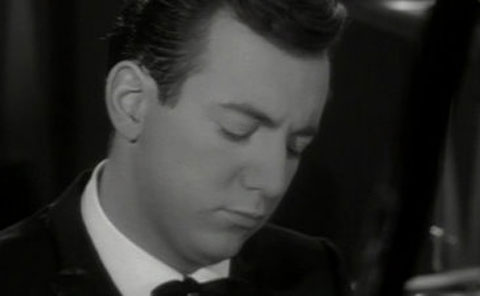
Then there are Pechter’s curious judgments that Bobby Darin in Too Late Blues offers “probably the only truly memorable performance” in all of John Cassavetes’ films, and that the poolroom brawl in the same film is “probably the single best-directed sequence in any Cassavetes film” — plausible only if one identifies with Darin and the crazed macho of that scene, incomprehensible if one doesn’t. (Personally, I find Everett Chambers in the same film a good deal more memorable — which probably brands me equally.)
Striking exceptions to this stance are Pechter’s regrets that certain films by Marco Bellocchio (notably, Victory March, the subject of “1976 Minus One”) and Satyajit Ray (in 1971, Days and Nights in the Forest) are undistributed in the U.S., his enjoyable retrospective digressions on the musical and James Cagney, and his periodic, rueful complaint that no great film has wended its way in his direction in this or that year. The latter fact may be irrelevant to my filmgoing life, but it’s central to his — a recurring problem in books of this kind.
In the course of expressing his respect for the formal conservatism of Eric Rohmer’s work — while admitting to some understandable qualms about the philistine uses to which this conservatism is sometimes put by other reviewers — Pechter hits on an ambivalence that approximates my own divided response to his criticism. Unlike the conservatism of a Manny Farber or a Donald Phelps, Pechter’s approach generally has more to do with how to think about films than with how to look at or listen to them. And in his choices of what to write about — in spite of an overall symmetrical shapeliness in the book that engagingly links first chapter to last, and such title chapter headings as “One Plus One,” “Movies Minus One,” and “1976 Minus One” — he’s usually so passive and uncritical about the whims of the marketplace and middlebrow chic that his book often reads like a record of his victimization. So many bad movies and sour stomachs: Rio Lobo, Bed and Board, The Boy Friend, Little Murders, A Clockwork Orange, What’s Up, Doc?, Deep Throat, Sleeper, Love and Anarchy, The Killer Elite, Buffalo Bill and the Indians. So many dead, crappy movies this book brings back to memory: To what avail?
I find all this a genuine pity. For during the same seven years that Pechter was training his intelligence on Allen, Altman, Antonioni, Bertolucci, Cassavetes, Coppola, Fosse, Kubrick, Malick, and Peckinpah, he was also consigning to oblivion such movies as Au Hasard Balthazar, La Camion, Celine and Julie Go Boating, History Lessons, Jeanne Dielman, Numéro Deux, Out 1: Spectre, Playtime, Scenes from Under Childhood, and Michael Snow’s trilogy of camera movement — none of which is even cited in his index. Admittedly, Commentary readers might not have sat still through columns about such films — all of which strike me as more enduring, intelligent, and interesting (a favorite Pechter word) than most of the items in his lackluster hit parade — but there’s no evidence that Pechter misses them at all, either. Indeed, defined by his genre of hardcover, collected criticism as a self-sufficient majority of one, there’s no reason why he necessarily should. But if he’s supposed to be writing about the state of the art in the early Seventies, his pickings are depressingly slim.
